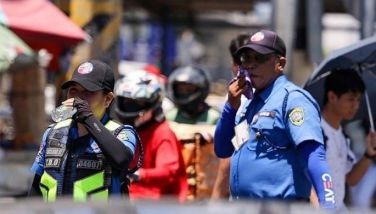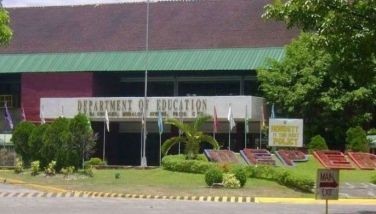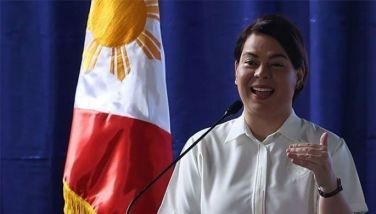Travel rules eased for minors, seniors

MANILA, Philippines — The government has modified quarantine and testing protocols for inbound travelers as well as interzonal travel protocols for Metro Manila residents, including seniors and minors, Malacañang said yesterday.
Presidential spokesman Harry Roque said effective Oct. 8, facility-based quarantine would be required for fully vaccinated inbound travelers coming from “green” and “yellow” risk countries until their PCR (polymerase chain reaction) tests – taken on the fifth day of isolation – come back negative.
“After this, they need to undergo home quarantine until their 10th day,” Roque said at a briefing.
People living in Metro Manila who are outside the 18 to 65 age bracket and fully vaccinated individuals including pregnant women and those with comorbidities are now allowed “point-to-point” interzonal travel to areas under general community quarantine, Malacañang also announced.
Roque said these new guidelines are subject to the health protocols prescribed by the Department of Tourism (DOT) and the local government unit of destination.
Metro Manila, the country’s COVID-19 epicenter, remains under Alert Level 4.
Partially vaccinated and unvaccinated travelers from the same countries or those whose vaccination status cannot be confirmed need to undergo facility-based quarantine until their PCR test results– – conducted on their 7th day of isolation – return. They have to undergo home quarantine until their 14th day.
Meanwhile, fully vaccinated inbound foreigners would also be required to secure their own pre-booked accommodation of at least six days and eight days for those who are unvaccinated, partially vaccinated or those whose vaccination status cannot be confirmed.
Roque also announced that the IATF requires fully vaccinated people who came into close contact with a probable or confirmed COVID-19 carrier to undergo “a seven-day quarantine period provided the individual remains asymptomatic for the duration of the seven-day period with the 1st day being the date immediately after the last exposure.”
“If in case the asymptomatic individual needs to get a swab test, this should be done not earlier than the fifth day after getting exposed,” he said. “On the other hand, no testing and quarantine shall be required for close contacts who may have been traced beyond the 7th day from last exposure and who have remained asymptomatic.
“Unvaccinated or partially vaccinated individuals who may be close contacts of suspect, probable and confirmed COVID-19 cases shall undergo a 14-day quarantine,” he added.
Meanwhile, Roque assured Metro Manila mayors that their recommendation to have pilot face-to-face classes in each city in the region would be considered in talks on its implementation on Nov. 15.
The Department of Education earlier said the pilot run would involve 59 public schools that the Department of Health has deemed capable to run face-to-face classes, most of which are in the Visayas and Mindanao.
“We have never devalued the calls and recommendation of Metro Manila mayors because they are the ones implementing the policies of the IATF. So, they would be taken into account,” he added.
‘Encouraging development’
The DOT welcomed the reduced quarantine period for inbound travelers, calling it an “encouraging development” for the country’s tourism industry.
The Inter-Agency Task Force for the Management of Emerging Infectious Diseases (IATF) earlier approved a resolution allowing vaccinated travelers to leave quarantine facilities as early as five days after their arrival, while unvaccinated persons could go home seven days after arrival.
In both cases, the travelers should have negative COVID-19 test results taken on the fifth day for the vaccinated and seventh for the unvaccinated.
The travelers should continue their remaining quarantine time at home, the government said.
“The reduction of the mandatory quarantine period for inbound travelers is an encouraging development for the country’s tourism industry,” Tourism Secretary Berna Puyat said.
“The easing of travel restrictions, particularly quarantine protocols, is a promising development as we inch closer to our goal of making the prospect of travel more appealing to our potential visitors,” she said. “The faster we are able to adjust to this situation, the faster we can bounce back better and regain our position in the global tourism market.”
General inbound tourism, however, is still not allowed, Puyat clarified.
The eased restrictions cover arrivals from countries and territories on the government’s green and yellow list.
“This move to shorten the period in quarantine facilities will be a relief to our kababayans this coming holiday season, This means less expenses for them and more time spent with their loved ones,” Puyat said.
Presidential adviser for entrepreneurship Joey Concepcion also welcomed the development, saying the government “listened to the call of the business sector to relax their health protocols for travelers.”
It would also help ramp up economic activity in the last months of the year, he said.
“With the shorter quarantine, many will be encouraged to fly, engage in economic activities and most importantly reunite with families with lesser costs in mind,” Concepcion said.
“This is a great Christmas gift for Filipino families. We have lost so many lives during this pandemic. Now, our balikbayans can spend time with their families. They can celebrate together with extra money to spend from the hotel quarantine savings,” he added.
“This is a another win for us and the airline companies like Philippine Airlines, Cebu Pacific and AirAsia who will benefit from this new development. Their industry has been badly hit and this is a way to help them recover,” Concepcion said.
Earlier, Concepcion led a discussion with IATF adviser Dr. Edsel Salvaña and with different airline industry stakeholders where proposals were raised for the removal of reverse transcription-PCR tests for domestic travel and limiting to five days the quarantine period for international travelers.
“We are also elated to know that some local areas are now allowing fully vaccinated travelers. This can persuade more people to go out of their homes to travel and give a boost to the local economy,” he said.
Among the LGUs that have eased restrictions for fully vaccinated travelers is Negros Occidental which has scrapped the RT-PCR test requirement for those who have received complete shots against COVID-19.
The Cebu provincial government has removed the negative RT-PCR test as requirement for entering the province. A medical certificate issued within 24 hours before arrival indicating the visitor has no symptoms of the virus would have to be presented instead.
“The business sector is hoping that other areas, especially the tourist destinations, would follow suit and relax guidelines for fully vaccinated travelers. This way, they can help boost tourism and ramp up economic activities in different parts of the country,” Concepcion said. – Ralph Edwin Villanueva, Louella Desiderio
- Latest
- Trending
































